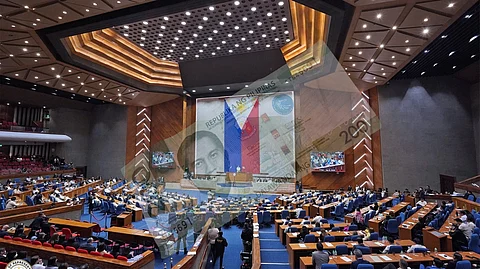
- NEWS
- the EDIT
- COMMENTARY
- BUSINESS
- LIFE
- SHOW
- ACTION
- GLOBAL GOALS
- SNAPS
- DYARYO TIRADA
- MORE

A proposed legislated wage hike for private sector workers failed to pass the 19th Congress after the Senate and the House of Representatives failed to reconcile their differing versions before adjourning sine die on Wednesday.
And now the finger-pointing has begun.
The House had approved a P200 daily wage hike under House Bill 11376, while the Senate had earlier passed Senate Bill 2534 proposing a P100 increase. But the lack of a bicameral conference to harmonize the two measures doomed the bill.
House spokesperson Princess Abante blamed the Senate for refusing to negotiate. “We were ready to deliberate and came in good faith,” Abante said. “But the Senate refused to negotiate. That’s not how democracy works.”
Abante said the Senate only notified the House of its bicameral panel appointments a day before adjournment, leaving no time for a proper meeting. She described the Senate’s stance as a “take-it-or-leave-it” ultimatum.
Senator Joel Villanueva, sponsor of the Senate bill, urged the House to adopt their version, citing time constraints. But House labor committee chair Fidel Nograles rejected the suggestion, emphasizing the need for a full bicameral deliberation to ensure transparency.
“It’s unfair to be cornered like this,” Nograles said. “We won’t be pressured into accepting the Senate’s version wholesale.”
Gabriela Rep. Arlene Brosas, a bicam member and co-author of the bill, called the collapse of the negotiations a disservice to workers. She said the House was open to a compromise if the final amount was fair.
The Senate passed its version in February 2023, while the House approved its measure only a week before adjournment. House lawmakers argued that if the Senate was truly committed to passing the bill, it could have swiftly adopted the House version.
Akbayan Rep. Perci Cendaña described the situation as a “wasted opportunity.” He said the bill could have become law had the Senate acted faster. “It’s as if the rush to start the long weekend mattered more than helping the struggling workers,” he said.
ACT Teachers Rep. France Castro echoed the frustration, claiming the Senate’s refusal to act reflected a bias for big business. She also criticized President Ferdinand Marcos Jr. for not certifying the bill as urgent.
Marcos had earlier raised concerns that a wage hike might fuel inflation and hurt micro, small and medium enterprises (MSMEs).
Had it passed, the legislation would have marked the first across-the-board wage increase since the 1989 Wage Rationalization Act.
The Employers Confederation of the Philippines (ECOP), the largest business group in the country, strongly opposed the measure, warning that MSMEs would suffer without state support.
ECOP president Sergio Ortiz-Luis Jr. noted that only about 10 percent of the 52 million-strong labor force were minimum wage earners, leaving out farmers, drivers, and informal workers.
Some business owners warned the hike could lead to layoffs and closures, while labor groups countered that current wages could no longer cover basic needs such as food, rent and transportation.
House Deputy Speaker Democrito Mendoza of the Trade Union Congress of the Philippines lamented the bill’s demise. “It could have been part of the President’s legacy,” he said. “Instead, what we got was silence.”
